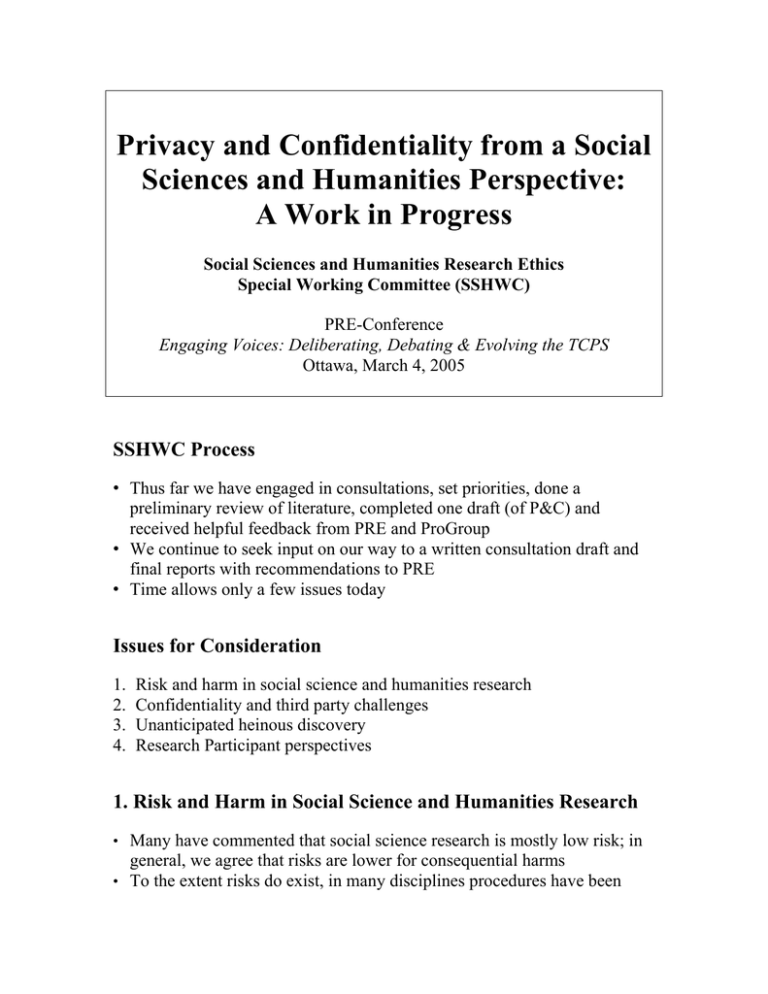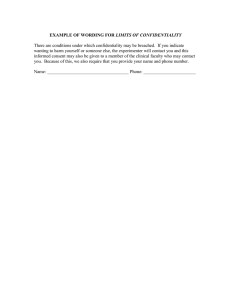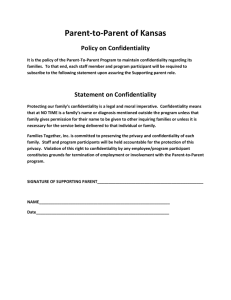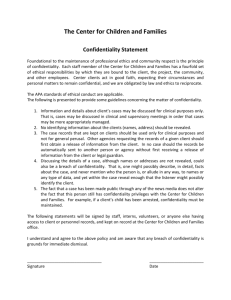Privacy and Confidentiality from a Social Sciences and Humanities Perspective:
advertisement

Privacy and Confidentiality from a Social Sciences and Humanities Perspective: A Work in Progress Social Sciences and Humanities Research Ethics Special Working Committee (SSHWC) PRE-Conference Engaging Voices: Deliberating, Debating & Evolving the TCPS Ottawa, March 4, 2005 SSHWC Process • Thus far we have engaged in consultations, set priorities, done a preliminary review of literature, completed one draft (of P&C) and received helpful feedback from PRE and ProGroup • We continue to seek input on our way to a written consultation draft and final reports with recommendations to PRE • Time allows only a few issues today Issues for Consideration 1. 2. 3. 4. Risk and harm in social science and humanities research Confidentiality and third party challenges Unanticipated heinous discovery Research Participant perspectives 1. Risk and Harm in Social Science and Humanities Research • Many have commented that social science research is mostly low risk; in general, we agree that risks are lower for consequential harms • To the extent risks do exist, in many disciplines procedures have been • • • • • • • developed to minimize them even further (e.g., anonymize; using unsigned “information sheets” or verbal only) Generally lower risk has implications for the review process; we encourage a light touch Saying that, in general, risks are low, does not mean that risks are absent, or that prospective harms cannot be significant Maintaining privacy through confidentiality is the primary ethical concern in much social research Formal challenges are rare, but disclosures with sensitive topics can be highly consequential to research participants’ freedom, financial situation, reputation, employment, insurability. Many challenges to maintaining confidences, e.g., low grade inquiries; team research The most formidable and worrisome challenges to maintaining privacy and confidentiality come through legal mechanisms and ethical considerations At the extremes are two rare but highly consequential situations: • third party challenges/threats • heinous discovery situations 2. Third Party Challenges • Researchers should consider not asking for information they would knowingly give up if ordered that would bring harm to the participant • When limitations are imposed, formal information gathering might be attenuated to reflect the reduced protection and not exploit the participant (see A.M. v Ryan) • Researchers, REBs and institutions have an ethical obligation to defend against threats • When information is sensitive and an identifiable third party threat is plausible, researchers should incorporate, and REBs encourage, a maximization of protection via anticipation of the Wigmore criteria: • Making sure the need for confidentiality is explained and documented; • Ensuring the expectation of confidentiality is mutual and clear • Avoiding “waivers of privilege” that make confidentiality impossible to defend 3. Unanticipated Heinous Discovery • “The unanticipated discovery of a prospective harm to an innocent third • • • • • • • party that is so heinous that a higher ethic calls for intervention” More complex an issue than we have seen considered. Not simply “duty to report” Not always something to be warned of as a limitation to confidentiality • By definition beyond the bounds of the research • The heinous discovery paradox Many issues: reconciling conflicting roles and standards; competent judgment; “hearsay” Identifying a minimal “bar” that must be surpassed before the violation of a pledge of confidentiality made in good conscience can be acceptable The Supreme Court in Smith v Jones said the following made violation permissible: • Serious injury or death; and • Imminent; and • Clearly identifiable target There are still obligations to the participant; the violation should be the minimum necessary to alleviate the prospective harm Requires case-by-case consideration: • Where there is no time the researcher acts in good conscience • Where there is time, the researcher should discuss alternatives with trusted colleagues 4. Participants’ Perspectives • The TCPS encourages researchers and REBs to adopt a “subject-centered perspective” • Regarding privacy and confidentiality, can inform us in two directions: • The protection of confidentiality -- When research is sensitive, evidence that confidentiality is essential is an important prerequisite to meeting the Wigmore test • Setting aside confidentiality – Where research participants want to be named • Is there a downside? Might it create ethical problems and/or excessively impede academic freedom? New conflicts? • An under-researched area; one of our SSHWC subgroups is doing some exploratory work in this area to identify issues and encourage further research in relation to confidentiality and other ethics principles Other Considerations • A literature has developed regarding the interaction of ethics and law, but still many gaps, e.g., • Implications of federal and provincial privacy legislation as sources of protection; • How to reconcile prospective divergences • Virtually no literature regarding participant perspectives, both in what these are, and their implications for the research context Next Steps • We are seeking further input through fora like this one • A public consultation period on a written document is planned for later this year • In the interim, contact us with questions and/or comments at… How To Reach SSHWC: PRE/SRE 350 Albert Street Ottawa, Ontario, K1A 1H5 Tel: (613) 996-0072 Fax: (613) 996-7117 secretariat@pre.ethics.gc.ca www.pre.ethics.gc.ca sshwc@pre.ethics.gc.ca





